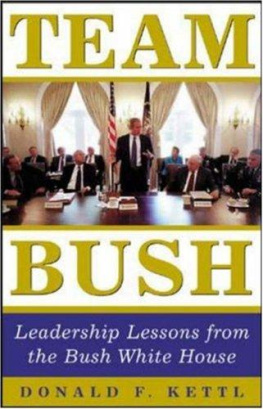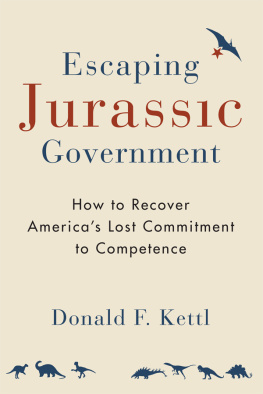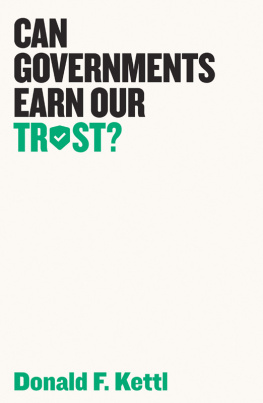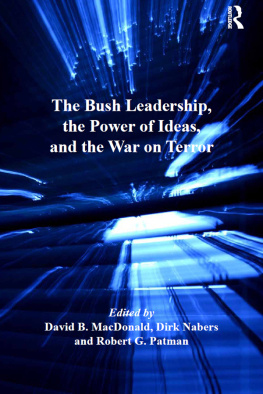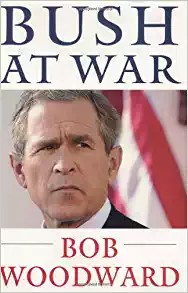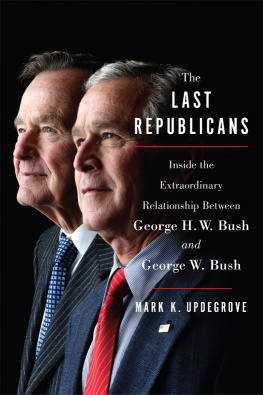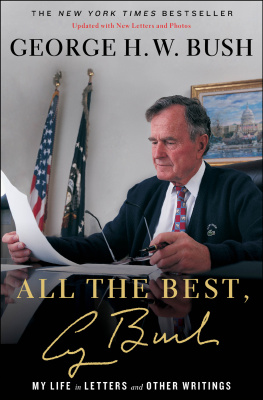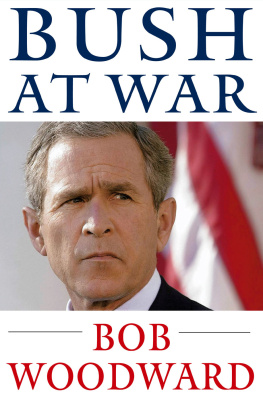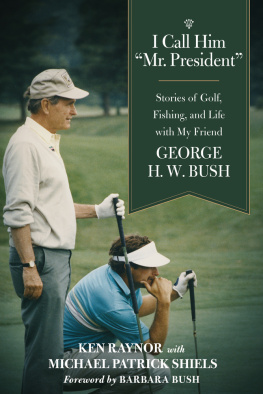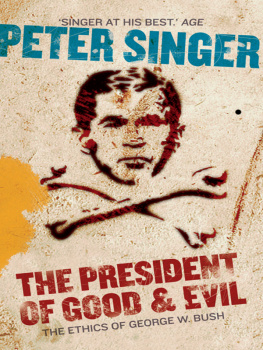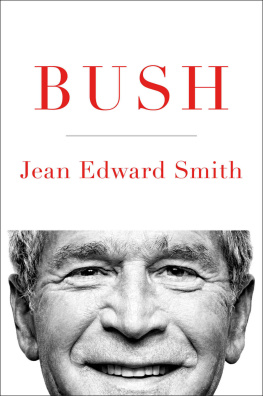Team BushLeadership Lessons from the Bush White House
Donald F. Kettl
McGraw-Hill
Copyright 2003 by The McGraw-Hill Companies, Inc. All rights reserved. Printed in the United States of America. Except as permitted under the United States Copyright Act of 1976, no part of this publication may be reproduced or distributed in any form or by any means, or stored in a data base or retrieval system, without the prior written permission of the publisher.
1 2 3 4 5 6 7 8 9 0 DOC/DOC 0 9 8 7 6 5 4 3
ISBN 0-07-141633-1
First edition
McGraw-Hill books are available at special quantity discounts to use as premiums and sales promotions, or for use in corporate training programs. For more information, please write to the Director of Special Sales, Professional Publishing, McGraw-Hill, Two Penn Plaza, New York, NY 10121-2298. Or contact your local bookstore.
This book is printed on recycled, acid-free paper containing a minimum of 50% recycled, de-inked fiber.
Team Bush is not authorized, endorsed by, or affiliated with President George W. Bush.
Library of Congress Cataloging-in-Publication Data
Kettl, Donald F.
Team Bush : leadership lessons from the Bush White House / by Donald F. Kettl.
p. cm.
ISBN 0-07-141633-1 (alk. paper)
1. Leadership. 2. Political leadership. 3. Bush, George W. (George
Walker), 1946- 4. United StatesPolitics and government2001 I. Title.
HD57.7.K49 2003
303.3'4'092dc21
2003000691
Acknowledgments
This book had its genesis in a series of conversations with Jeffrey Krames at McGraw-Hill. He raised the key questions: What is George W. Bushs style? How does it differ from the styles that other presidents have developed? Does it seem to workfor him and, just as importantly, for the country? The questions launched me down the winding road that ended in this book. Im grateful indeed for his provocative suggestions and constant insights along the way.
The book benefited enormously from conversations and interviews with a great many people, including both Washington insiders and experts who have long followed presidential politics. Im especially indebted to extended conversations with Charles O. Jones (University of Wisconsin-Madison), Thomas Mann (Brookings Institution), William Eggers (Deloitte Research and manager of the Texas Performance Review during Bushs governorship), and Vance McMahon (Bushs gubernatorial policy adviser). In addition, I interviewed a number of experts who spoke on background and requested anonymity. They immeasurably enriched the book.
Zachary Oberfield proved an untiring and unfailingly helpful researcher. He dug out important nuggets for the bookand he always proved a valued colleague in talking through the issues raised by Bushs management style. He is a true professional in every respect.
McGraw-Hills production staff was every authors dream. Im especially indebted to Tom Lau, who designed the books cover. He perfectly captured not only the Bush style but also the new blue-and-gold look that Bush brought to the Oval Office. Editing supervisor Scott Kurtz and production supervisor Maureen Harper flawlessly and painlessly managed the books production. Likewise, Patty Wallenburgs typesetting was also exemplary and incredibly swift.
I owe the greatest debts to my parentswho taught me first and best about what teamwork really meansand to my wife, Sue. She not only provided unflagging support through the writing but also remarkably keen insight into how best to frame the books themes. She is the best teammate an author (or husband) could ever have.
Donald F. Kettl
Birth of a Commander-in-Chief
This stuff about transformed? From my perspective, he is the same President Bush that I saw going through different issues in Texas. Hes always been decisive, hes always been disciplined, hes always been really focused, hes always been a really good delegator.
Karen Hughes, on the change in President Bush after September 11
Throughout his career as a political executive, George W. Bush has consistently exceeded expectations. Doing it once or twice might be lucky. Doing it over and over has to require real skill.
Whats the secret? Bush has carefully honed a style, based on building an effective team, to make strong decisions. He doesnt try to master the complexities of decisions. Rather, he builds a team, he makes them master the complexities, he has them frame the issuesand then he decides, firmly and without second thoughts. Hes ridden this style, over and over, to successes that have amazed his friends and stunned his foes.
Consider a quick scorecard. Few analysts gave him a chance of unseating Texas Governor Ann Richards in 1994, yet he beat her in the race. Political handicappers gave him slim odds for a successful gubernatorial term, but he rolled to a huge victory in 1998. He explored a presidential run, but cynics suggested he wasnt nearly smart enough to be the nations chief executive. When he won the nomination, Democrats relished the idea of Al Gore taking him on.
One Republican insider, in fact, quietly whispered that watching Bush debate was like watching his 12-month-old daughter try to walk, never knowing when she might fall on her face.
Bush astounded everyone by holding his own against the vice president. He rode his debate performance to a razor-thin presidential victory. When he got to Washington, insiders discounted the chance that he could accomplish anything. Most Americans doubted that Bush and congressional Democrats could put politics aside to work together. But he cobbled together enough votes to pass a big, 10-year tax cut.
Even his friends were worried about how ready hed be to make foreign policy decisions. During the campaign, BBC News asked bluntly, Can nice guy George Junior shed his image as a political lightweight and demonstrate that hes made of steel? Has he got what it takes for one of the most powerful jobs in the world?
But in the aftermath of the September 11 terrorist attacks, Bush rallied the country. When he threatened the Taliban in Afghanistan, skeptics pointed to the Russians devastating defeat in their own war with that country. Analysts warned that Bushs plan might draw the United States into another Vietnam. Bush attacked anyway. Within weeks the Taliban crumbled. Bushs approval rating soared to the highest level ever recorded.
Democrats reassured themselves with the fact that the presidents party almost always loses seats in the midterm congressional elections. They thought they could keep control of the Senate and dreamed of retaking the House. Bush launched a whirlwind last-week salvo of campaigning. Republicans not only retained control of the House in 2002 but retook the Senate. Bush yet again exceeded expectations. In the process, he solidified his position. He worked to capitalize on his strength by launching an economic stimulus plan, seeking to disarm Saddam Hussein, and countering North Koreas threats to destabilize Asia.
In the aftermath of the September 11 attacks, the clear consensus was that the world had fundamentally changed. In a stirring editorial, the New York Times said, It was, in fact, one of those moments in which history splits, and we define the world as before and after. The sudden, awesome impact of the terrorists attacks fundamentally transformed everything about the country and its role in the world.
If the world had changed, the striking thing is that Bush had not. He was the same man, with the same style, as he had been as Texas governor. He had a strong sense of confidence, a vision of what ought to be done, and a determination to do the job right. He focused on the big picture with a decide-and-delegate style torn from the pages of MBA casebooks. He didnt devise a new style to deal with the unimaginable catastrophe. He put to work the style he had developed throughout his life and had honed as Texas governor.

